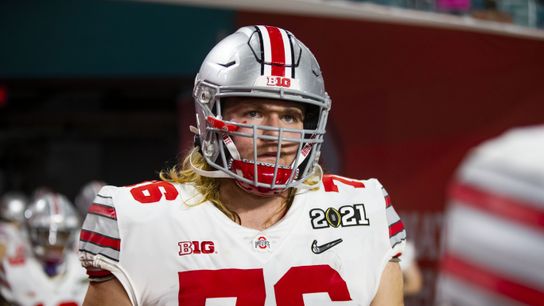Our football playing days end sooner than we'd like for the vast majority of us. For a sizable minority of that group, their body gives out before their talent does. We call that a medical retirement.
It's not uncommon for a college football player to medically retire, and to announce his retirement in a Twitter post. In fact, such statements are unfortunately common. The first sentence in Harry Miller's medical retirement announcement was not.
"Prior to the season last year, I told Coach (Ryan) Day of my intention to kill myself."
Miller is, or was, an Ohio State offensive lineman. His 247Sports profile, where he is rated 5 stars, describes him as "(s)olid, barrel-chested build with little bad weight. Is developed from a weight-room and strength standpoint." It projects Miller as "a multi-year Power 5 starter and Day 2 NFL Draft selection."
In addition to being one of the best athletes for his size in the nation, Miller is also a 4.0 student in Ohio State's College of Engineering. Any one of us would look at Harry Miller and conclude he had everything going for him, that the limit on what he could accomplish in life was somewhere south of the moon.
And yet Miller wanted to kill himself.
"A person like me, who supposedly has the entire world in front of them, can be fully prepared to give up the world (entirely). This is not an issue reserved for the far and away. It is in our homes. It is in our conversations. It is in the people we love."
Mental illness does not carry about Harry Miller's status as a Buckeye football player. It made him not care about anything, wearing him down until it made him stop caring about his own life.
As it happens, Day is the leading expert, among Power 5 head coaches, about mental health in adolescents. Day's father died by suicide when he was eight, driving he and his wife Christina to create the Christina and Ryan Day Fund for Pediatric and Adolescent Mental Wellness.
“I think that when you grow up and you’re young and something like that happens, you go through a range of emotions from angry to sad to resentment,” Day said in 2019. “And then as you get older, you start to realize in your 20s and 30s, it kind of makes more sense on what happened, you have a better perspective of what it is. And so, growing up, I didn’t quite understand what all went down. And then as I get older, I start to realize that it was a sickness, and that there’s people out there that need help.”
"I am grateful for the infrastructure Coach Day has put in place at Ohio State, and I am grateful that he is letting me find a new way to help others in the program," Miller wrote. "I hope athletics departments around the country do the same. If not for him and the staff, my words would not be a reflection. They would be evidence in a post-mortem."
— Harry Miller (@h_miller76) March 10, 2022
The point of this post is not to praise Day and Ohio State. It's a reminder that the influence coaches wield over the players in their care are not just a platitude those in the profession remind each other of during the happy-talk portion of a clinic talk. It's real.
Harry Miller was thinking about killing himself, and felt comfortable enough with his head coach to come to his office and tell him.
